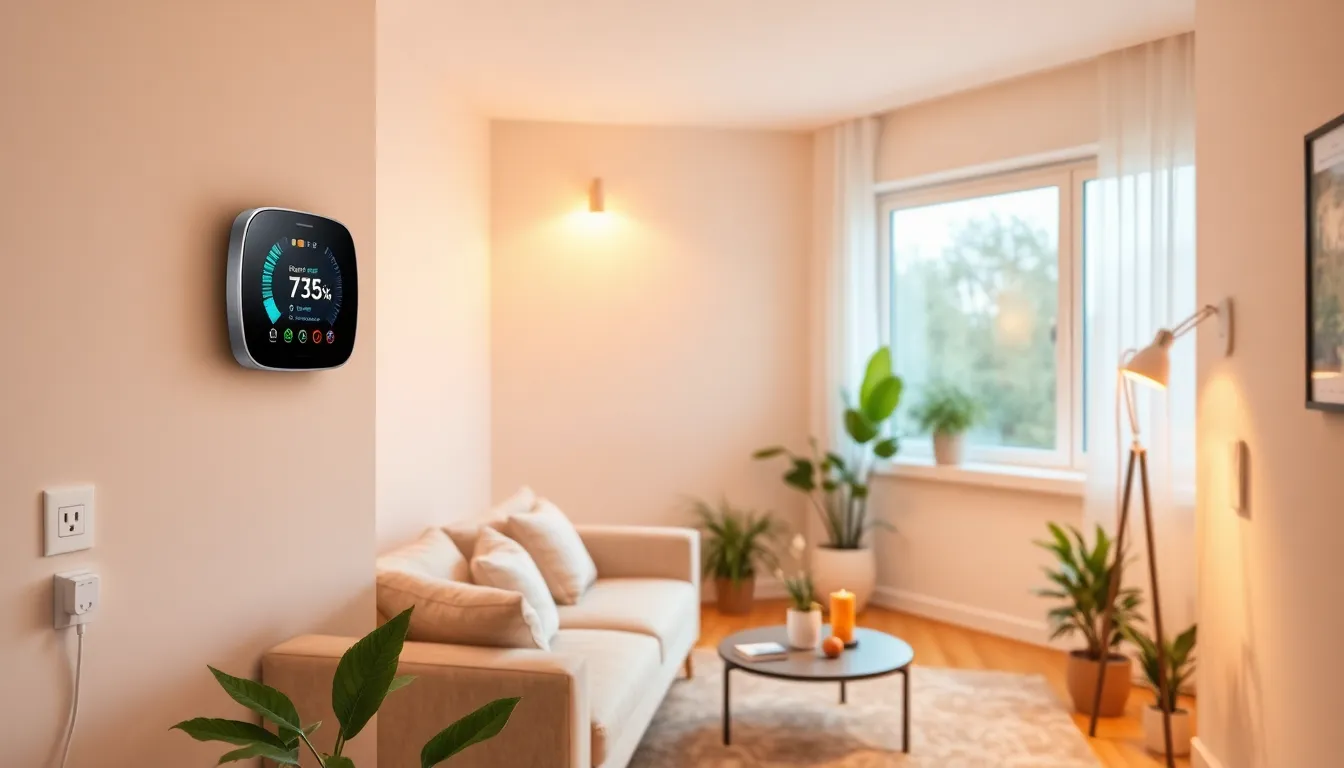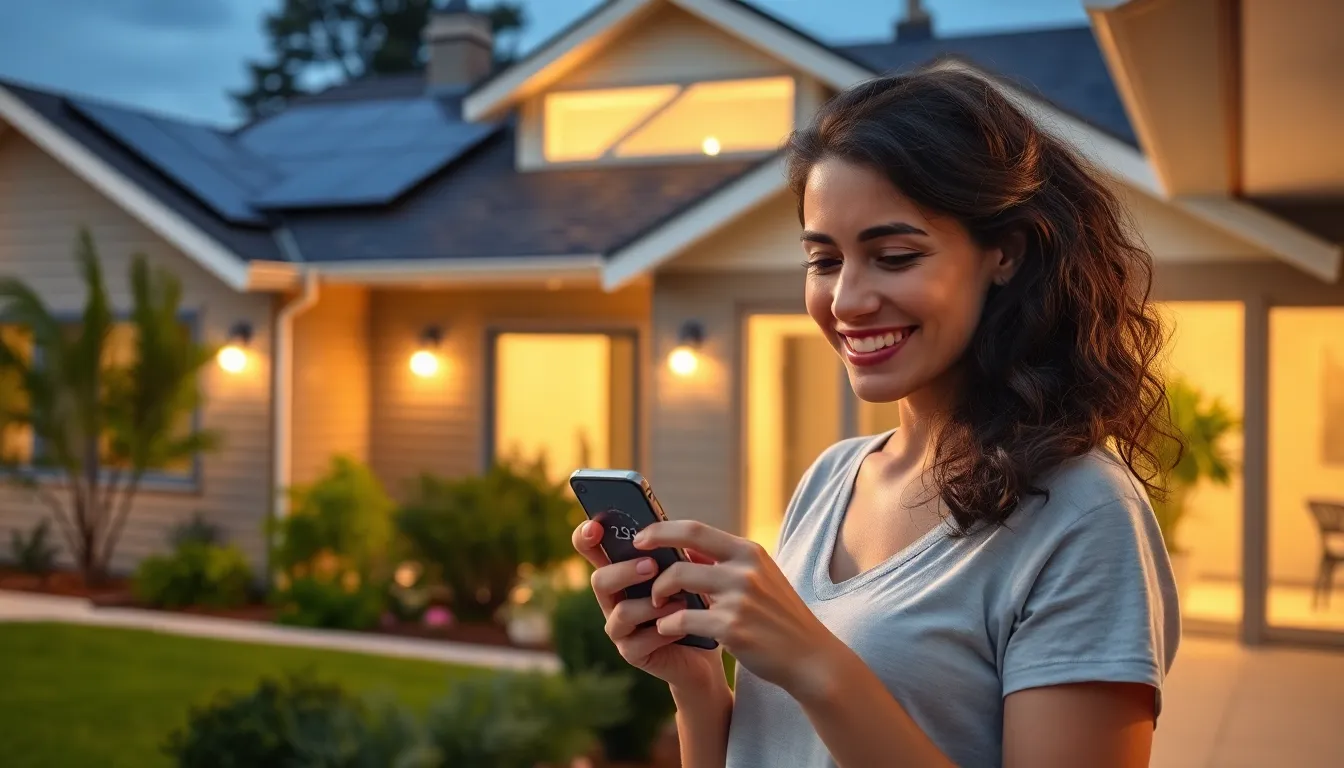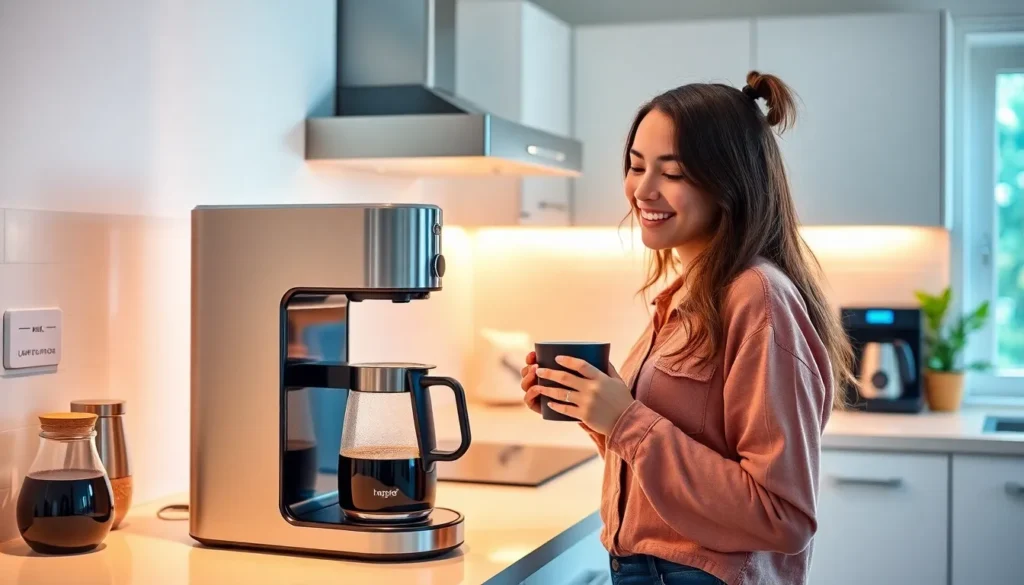Imagine a home that not only caters to your every whim but also saves you money while doing it. Welcome to the world of energy-efficient smart homes, where technology meets sustainability in a dance that even Mother Nature would applaud. These homes don’t just make life easier; they make it smarter, so you can spend less time worrying about energy bills and more time binge-watching your favorite shows guilt-free.
Table of Contents
ToggleOverview of Energy Efficient Smart Homes
Energy efficient smart homes integrate advanced technology to optimize energy consumption while providing enhanced comfort. Smart thermostats, such as Nest and Ecobee, adjust heating and cooling automatically based on occupants’ preferences and schedules. Intelligent lighting systems, including Philips Hue and Lutron, allow users to control brightness and color temperature through apps, significantly reducing electricity usage.
Automated energy monitoring devices track energy consumption patterns, enabling homeowners to identify areas for improvement. Sensors can detect occupancy, ensuring lights and appliances operate only when needed. Solar panels, commonly used in these homes, generate renewable energy, further minimizing reliance on conventional energy sources.
When energy-efficient appliances, such as Energy Star-rated refrigerators and washing machines, are utilized, energy savings become even more significant. These appliances consume less electricity and water compared to traditional models. Additionally, smart home gadgets often provide real-time feedback on energy usage, empowering occupants to make informed decisions.
Smart home systems also integrate with home automation platforms, like Amazon Alexa or Google Assistant, allowing for seamless voice control of devices. Increased convenience and efficiency contribute to lower energy bills. Overall, energy efficient smart homes exemplify how technology and sustainable practices coexist to enhance living environments, making daily routines simpler while promoting environmental responsibility.
Key Features of Energy Efficient Smart Homes

Energy-efficient smart homes incorporate various features that enhance both sustainability and comfort. These technologies optimize energy consumption while providing convenience.
Smart Lighting Systems
Smart lighting systems offer automated control over indoor and outdoor lighting. They allow users to adjust brightness and color temperature based on preference and time of day. Systems such as Philips Hue and Lutron enable homeowners to schedule lighting based on activity or occupancy. Energy savings occur as these lights can turn off automatically when rooms are unoccupied. Furthermore, using LED bulbs within these systems significantly reduces overall electricity consumption. Homeowners benefit from remote access via mobile apps, making it easy to control lighting from anywhere.
Smart Thermostats
Smart thermostats provide precise control over heating and cooling systems. By learning occupants’ habits, they make automatic adjustments to optimize comfort and efficiency. Devices like Nest and Ecobee utilize sensors to detect occupancy and temperature preferences. The result is lower energy usage during periods when homes are unoccupied. Homeowners can remotely manage these settings via smartphones, ensuring maximum efficiency even when away. Furthermore, many models provide detailed energy reports, allowing users to track patterns and optimize usage further.
Energy Monitoring Devices
Energy monitoring devices help track energy consumption in real-time. Smart plugs and dedicated energy monitoring systems provide insights into energy usage patterns. Homeowners can identify energy hogs and adjust usage accordingly to maximize savings. By analyzing reports, users make informed decisions about appliances and devices. These systems often integrate with smart home platforms, providing a comprehensive view of overall energy consumption. As a result, monitoring allows for proactive adjustments to enhance efficiency, leading to reduced utility bills.
Benefits of Energy Efficient Smart Homes
Energy-efficient smart homes offer a range of advantages that enhance both living quality and sustainability. These benefits extend to cost savings, environmental impact, and increased comfort.
Cost Savings
Energy-efficient smart homes lead to significant cost savings. Smart thermostats adjust temperatures automatically, reducing heating and cooling expenses by up to 20%. Homeowners can also save on electricity bills with intelligent lighting systems that use energy-efficient bulbs and adjust based on occupancy. Monitoring devices help identify high energy usage, allowing owners to correct inefficiencies. Using Energy Star-rated appliances further lowers consumption, often resulting in annual savings of hundreds of dollars. Overall, investments in these technologies quickly translate into financial return.
Environmental Impact
The environmental impact of energy-efficient smart homes is profound. These homes lower greenhouse gas emissions by optimizing energy use, encouraging a reduction of the carbon footprint. Solar panels harness renewable energy, promoting sustainability and reducing dependence on fossil fuels. Smart water management systems minimize waste, significantly contributing to resource conservation. In total, eco-friendly practices in smart homes support a cleaner environment, benefiting both the planet and future generations.
Enhanced Comfort and Convenience
Enhanced comfort and convenience characterize energy-efficient smart homes. Smart lighting systems provide customizable settings that adjust to users’ preferences, creating optimal ambiance. Automated HVAC systems maintain consistent temperatures based on individual habits, enhancing living comfort. Voice-controlled interfaces allow for easy management of devices, streamlining home life. Responsive sensors activate lights and appliances only when needed, saving energy and increasing ease of use. Collectively, these features create a seamless and enjoyable living experience.
Challenges and Considerations
Implementing an energy-efficient smart home involves various challenges and considerations that homeowners should evaluate.
Initial Investment
Upfront costs for energy-efficient smart homes can be significant. Homeowners may spend anywhere from $5,000 to $30,000 on smart home technology, depending on the level of integration. While smart thermostats and lighting systems offer immediate savings, other features, like solar panel installations, require larger investments. Long-term savings typically offset these costs, but initial budgeting remains crucial for planning. Financing options or incentives from local governments sometimes ease this burden, enabling wider adoption. Homeowners may find that starting with a few key devices allows gradual upgrades, ensuring manageable expenditures.
Technological Compatibility
Ensuring compatibility among devices poses another challenge. Many smart home products come from different manufacturers, leading to potential integration issues. Users may experience frustration if devices cannot communicate effectively within a single system. Selecting products that support common standards, like Zigbee or Z-Wave, helps streamline coordination. Homeowners often benefit from consulting compatibility guides provided by manufacturers. In addition, installations by professionals can resolve many tech-related hiccups, providing peace of mind alongside advanced features. Prioritizing interoperability when purchasing devices enhances efficiency and maximizes the smart home’s potential.
Energy-efficient smart homes represent a significant advancement in modern living. By merging technology with sustainability, they offer homeowners a unique opportunity to enhance comfort while minimizing energy costs. The integration of smart devices not only simplifies daily routines but also promotes environmentally responsible practices.
As homeowners embrace this innovative lifestyle, the potential for long-term savings becomes increasingly evident. While the initial investment may seem daunting, the benefits of reduced energy bills and increased convenience far outweigh the costs. With careful planning and the right product selections, anyone can enjoy the numerous advantages of an energy-efficient smart home.




